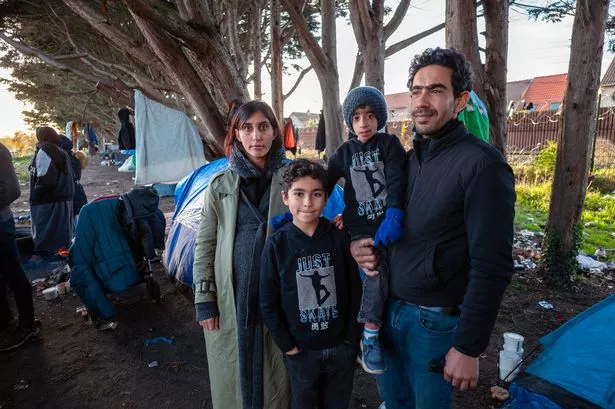Wissam Saleh, a young boy burdened by a severe and undisclosed medical condition, became the face of a desperate family’s plight in their homeland. Facing limited medical resources and expertise, Wissam’s family, residing in a region ravaged by conflict and instability, harbored a single, unwavering hope: to seek advanced medical care for their ailing son in England. This aspiration, however, was fraught with immense challenges, demanding a treacherous journey across perilous lands and unforgiving seas. Driven by the primal instinct to protect their child and fueled by a glimmer of hope for his recovery, Wissam’s parents made the agonizing decision to embark on a clandestine voyage to Britain, a journey that would ultimately alter their lives forever.
Their journey began under the shroud of secrecy, navigating through war-torn landscapes and evading authorities. The family faced constant fear of apprehension and the ever-present danger posed by criminal elements exploiting vulnerable migrants. They endured hardship, hunger, and exhaustion, their determination fueled solely by the image of Wissam receiving the life-saving treatment he desperately needed. This clandestine exodus, undertaken by countless families fleeing conflict and seeking refuge, exposed the harsh realities of a broken world, a world where access to basic healthcare was a privilege denied to many.
Upon reaching the European shores, the Saleh family confronted yet another formidable obstacle: the perilous crossing of the English Channel. This treacherous stretch of water, known for its strong currents and unpredictable weather, has claimed the lives of many desperate souls seeking a new beginning. Forced to rely on overcrowded and often unseaworthy vessels operated by unscrupulous smugglers, the family braved the tumultuous waves, their hopes intertwined with the fragile vessel carrying their dreams. The inherent risks were amplified by the lack of safety equipment and the sheer number of people packed into these precarious boats, making the crossing a gamble with fate.
Tragedy struck with unforgiving swiftness. Amidst the churning waters of the Channel, the overcrowded boat carrying Wissam and his family capsized, tossing its human cargo into the icy depths. The chaotic scene unfolded under the cloak of darkness, with cries for help swallowed by the roaring waves. The Saleh family, along with countless others, were plunged into a desperate struggle for survival. The frantic scramble for life rafts and floating debris painted a harrowing picture of the human cost of desperation and the cruel indifference of the sea.
Wissam, weakened by his pre-existing medical condition, succumbed to the unforgiving elements. His small, fragile body, already battling illness, was unable to withstand the harshness of the cold water and the trauma of the capsizing. His parents, despite their own desperate struggle for survival, fought valiantly to save their son, their efforts ultimately proving futile. The heartbreaking image of a young life lost at sea underscored the tragic consequences of families forced to take such perilous journeys in search of a better life. Wissam’s story serves as a stark reminder of the human cost of conflict, displacement, and the desperate measures families resort to when faced with insurmountable challenges.
The Saleh family’s story, tragically cut short by the unforgiving sea, represents the countless untold narratives of individuals and families seeking refuge and opportunity. Their perilous journey, undertaken with the purest of intentions – to save their child’s life – ended in unimaginable heartbreak. Wissam’s untimely demise serves as a poignant testament to the urgent need for comprehensive, humane solutions to address the root causes of displacement and migration. It underscores the critical importance of providing access to adequate healthcare and resources in conflict-ridden regions and creating safe, legal pathways for those seeking asylum. Ultimately, Wissam’s story compels us to confront the profound moral questions surrounding global inequality, access to healthcare, and the collective responsibility we bear towards those seeking refuge from despair. It is a call to action, a plea for empathy and understanding, and a reminder that behind every statistic lies a human story of hope, resilience, and ultimately, tragedy.














